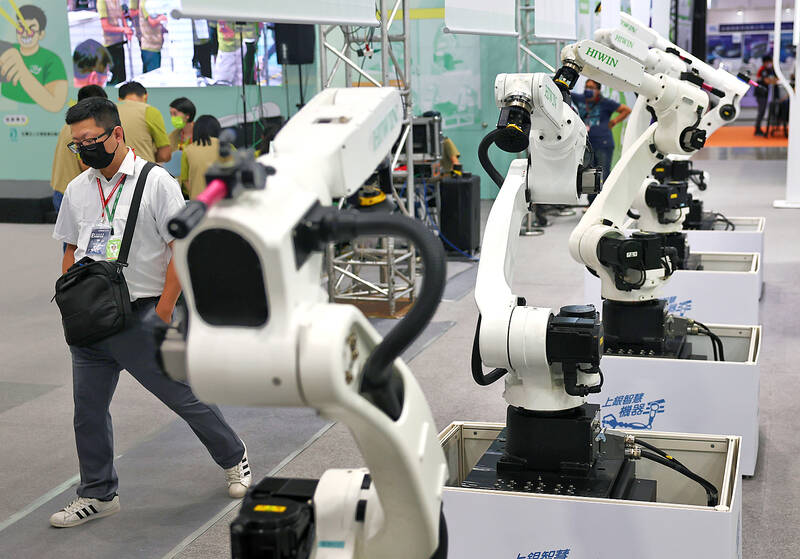Taiwan has added 77 items to the list of machine tools restricted from being exported to Russia and Belarus that is set to take effect on March 8 in a bid to prevent the Russian military from using Taiwan’s high-tech products in its war in Ukraine, the Ministry of Economic Affairs (MOEA) said yesterday.
Taiwan imposed export controls on a number of high-end machine tools to Russia and Belarus last year and is widening the scope of export restrictions to 77 additional products to stay in line with the tightened export sanctions imposed by the European Union, the US and Japan, an official with the ministry’s International Trade Administration (ITA) said.
The items added to the new export controls list include sophisticated equipment called CNC machine tools, machining centers, lathes and turning machines, milling machines, and grinding machines.

Photo: CNA
Taiwan’s exports of the 77 items to Russia reached US$45 million last year, accounting for 1.47 percent of Taiwan’s total exports to Russia, the ITA official said.
With increasing global awareness of the risk posed by weapon proliferation, if Taiwan’s machine tools were found to be exported to Russia for the production of military weapons, this could affect German and Japanese key component manufacturers’ willingness to sell their products to Taiwan and thus impact the upstream and downstream supply chain in the machine tool industry, the official said.
The ministry said it has also requested Taiwanese manufacturers exporting to countries such as Turkey and the United Arab Emirates, which are considered to have a high risk of reshipping the products, to agree not to redirect shipments to Russia and Belarus.
The Taiwan Machine Tool and Accessory Builder’s Association said yesterday that the expanded sanctions against specific exports to Russia are expected to affect the entire industry and it hopes the government will help businesses in the industry to upgrade and transform their techniques and technology.
The association also expressed hopes the government would seek to sign free-trade agreements with trade partners and join the Comprehensive and Progressive Agreement for Trans-Pacific Partnership (CPTPP), an Asia-Pacific trade bloc, to allow Taiwanese businesses to enjoy preferential tariffs and help them expand internationally.

Micron Memory Taiwan Co (台灣美光), a subsidiary of US memorychip maker Micron Technology Inc, has been granted a NT$4.7 billion (US$149.5 million) subsidy under the Ministry of Economic Affairs A+ Corporate Innovation and R&D Enhancement program, the ministry said yesterday. The US memorychip maker’s program aims to back the development of high-performance and high-bandwidth memory chips with a total budget of NT$11.75 billion, the ministry said. Aside from the government funding, Micron is to inject the remaining investment of NT$7.06 billion as the company applied to participate the government’s Global Innovation Partnership Program to deepen technology cooperation, a ministry official told the

Taiwan Semiconductor Manufacturing Co (TSMC, 台積電), the world’s leading advanced chipmaker, officially began volume production of its 2-nanometer chips in the fourth quarter of this year, according to a recent update on the company’s Web site. The low-key announcement confirms that TSMC, the go-to chipmaker for artificial intelligence (AI) hardware providers Nvidia Corp and iPhone maker Apple Inc, met its original roadmap for the next-generation technology. Production is currently centered at Fab 22 in Kaohsiung, utilizing the company’s first-generation nanosheet transistor technology. The new architecture achieves “full-node strides in performance and power consumption,” TSMC said. The company described the 2nm process as

POTENTIAL demand: Tesla’s chance of reclaiming its leadership in EVs seems uncertain, but breakthrough in full self-driving could help boost sales, an analyst said Chinese auto giant BYD Co (比亞迪) is poised to surpass Tesla Inc as the world’s biggest electric vehicle (EV) company in annual sales. The two groups are expected to soon publish their final figures for this year, and based on sales data so far this year, there is almost no chance the US company led by CEO Elon Musk would retain its leadership position. As of the end of last month, BYD, which also produces hybrid vehicles, had sold 2.07 million EVs. Tesla, for its part, had sold 1.22 million by the end of September. Tesla’s September figures included a one-time boost in

Shares in Taiwan closed at a new high yesterday, the first trading day of the new year, as contract chipmaker Taiwan Semiconductor Manufacturing Co (TSMC, 台積電) continued to break records amid an artificial intelligence (AI) boom, dealers said. The TAIEX closed up 386.21 points, or 1.33 percent, at 29,349.81, with turnover totaling NT$648.844 billion (US$20.65 billion). “Judging from a stronger Taiwan dollar against the US dollar, I think foreign institutional investors returned from the holidays and brought funds into the local market,” Concord Securities Co (康和證券) analyst Kerry Huang (黃志祺) said. “Foreign investors just rebuilt their positions with TSMC as their top target,